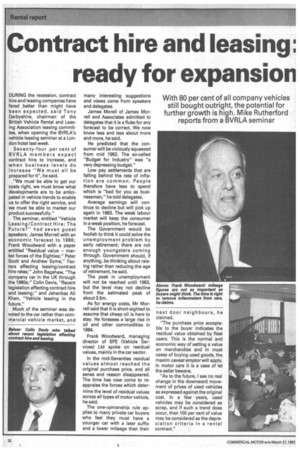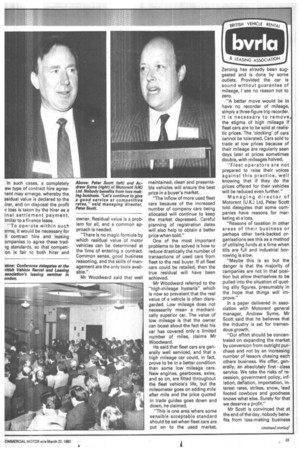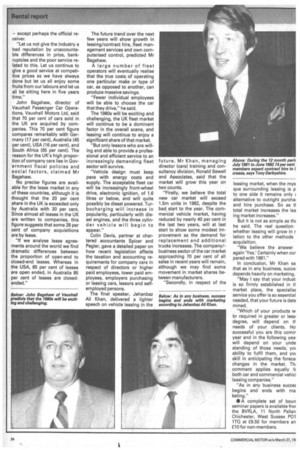Contract hire and leasing: ready for expansion
Page 24

Page 25

Page 26

If you've noticed an error in this article please click here to report it so we can fix it.
With 80 per cent of all company vehicles still bought outright, the potential for further growth is high. Mike Rutherford reports from a BVRLA seminar
DURING the recession, contract hire and leasing companies have fared better than might have been expected, said Tony Derbyshire, chairman of the British Vehicle Rental and Leasing Association leasing committee, when opening the BVRLA's vehicle leasing seminar at a London hotel last week.
Seventy-four per cent of BVRLA members expect contract hire to increase, and when business levels do increase "We must all be prepared for it", he said.
"We must be able to get our costs right, we must know what developments are to be anticipated in vehicle trends to enable us to offer the right service, and we must be able to market our product successfully."
The seminar, entitled "Vehicle Leasing/Contract Hire; The Future?" had seven guest speakers; James Morrell with an economic forecast to 1986; Frank Woodward with a paper entitled "Residual value — market forces of the Eighties;" Peter Scott and Andrew Syme," Factors affecting leasing/contract hire rates;" John Bag sh aw, "The company car in the UK through the 1980s;" Colin Davis, "Recent legislation affecting contract hire and leasing;" and Jehanbaz Ali Khan, "Vehicle leasing in the future."
Much of the seminar was devoted to the car rather than commercial vehicle market, and many interesting suggestions and views came from speakers and delegates.
James Morell of James Morrell and Associates admitted to delegates that it is a fluke for any forecast to be correct. We now know less and less about more and more, he said.
He predicted that the consumer will be viciously squeezed from mid 1982. The so-called "Budget for Industry" was "a very depressing budget."
Low pay settlements that are falling behind the rate of inflation are common. People therefore have less to spend which is "bad for you as businessmen," he told delegates.
Average earnings will continue to decline but will pick up again in 1983. The weak labour market will keep the consumer in a weak position, he forecast.
The Government would be foolish to think it could solve the unemployment problem by early retirement; there are not enough youngsters coming through. Government should, if anything, be thinking about raising rather than reducing the age of retirement, he said.
The peak in unemployment will not be reached until 1983, but the level may not decline from the estimated peak of about 3.5m.
As for energy costs, Mr Morrell said that it is short-sighted to assume that cheap oil is here to stay. He foresees a large rise in oil and other commodities in 1984.
Frank Woodward, managing director of SPE (Vehicle Services) Ltd spoke on residual values, mainly in the car sector.
In the mid-Seventies residual values almost reached the original purchase price, and all sense and reason disappeared. The time has now come to reappraise the forces which deter mine the level of residual values across all types of motor vehicle, he said.
The one-upmanship rule applies to many private car buyers who feel they must have a younger car with a later suffix and a lower mileage than their next door neighbours, he claimed.
"The purchase price acceptable to the buyer indicates the residual value obtained by fleet users. This is the normal and economic way of setting a value on merchandise and in most cases of buying used goods, the maxim caveat emptor will apply. In motor cars it is a case of let the seller beware.
"As to the future, I see no real change in the downward movement of prices of used vehicles as expressed against the original cost. In a few years, used vehicles may be considered as scrap, and if such a trend does occur, then 100 per cent of value may be considered as the depreciation criteria in a rental contract."
In such cases, a completely lew type of contract hire agreenent may emerge, whereby the esidual value is declared to the &el., and on disposal the profit
■ r loss is taken by the hirer as a inal settlement payment, imilar to a finance lease.
"To operate within such arms, it would be necessary for ill contract hire and leasing ompanies to agree these tradng standards, so that competiion is fair to both hirer and owner. Residual value is a problem for all, and a common approach is needed.
"There is no magic formula by which residual value of motor vehicles can be determined at the time of entering a contract. Common sense, good business reasoning, and the skills of management are the only tools available."
Mr Woodward said that well maintained, clean and presentable vehicles will ensure the best price in a buyer's market.
"The inflow of more used fleet cars because of the increased number of company cars being allocated will continue to keep the market depressed. Careful planning of registration dates will also help to obtain a better price when sold."
One of the most important problems to be solved is how to reduce drastically the number of transactions of used cars from fleet to the real buyer. If all fleet cars could be retailed, then the true residual will have been achieved.
°Mr Woodward referred to the "high-mileage hysteria" which is now so prevalent that the real value of a vehicle is often disregarded. Low mileage does not necessarily mean a mechani cally superior car. The value of low mileage is that the owner can boast about the fact that his car has covered only a limited number of miles, claims Mr Woodward.
He said that fleet cars are generally well serviced, and that a high mileage car could, in fact, prove to be in a better condition than some low Mileage cars.
New engines, gearboxes, axles, and so on, are fitted throughout the fleet vehicle's life, but the mileometer goes on adding mile after mile and the price quoted in trade guides goes down and down, he claimed.
"This is one area where some sensible acceptable standard should be set when fleet cars are put on to the used market. Zeroing has already been suggested and is done by some outlets. Provided the car is sound without guarantee of mileage, I see no reason not to zero.
"A better move would be to have no recorder of mileage, simply a three-figure trip recorder. It is necessary to remove, the stigma of high mileage if fleet cars are to be sold at realistic prices. The 'clocking' of cars cannot be tolerated. Cars sold to trade at low prices because of their mileage are regularly seen days later at prices sometimes double, with mileages halved.
"Fleet operators are not prepared to raise their voices against this practice, well knowing that if they do the prices offered for their vehicles will be reduced even further."
Managing director of Motorent (U.K.) Ltd, Peter Scott told delegates that some companies have reasons for marketing at a loss.
"Reasons of taxation in other areas of their business or perhaps other bank-backed organisations see this as a method of utilising funds at a time when tills are full and industrial borrowing is slow.
"Maybe this is so but the danger is that the majority of campanies are not in that position but allow themselves to be pulled into the situation of quoting silly figures, presumably in the hope that things will improve."
In a paper delivered in association with Motorent general manager, Andrew Syme, Mr Scott said that he believes that the industry is set for tremendous growth.
"Our effort should be concentrated on expanding the market by conversion from outright purchase and not by an increasing number of lessors chasing each others business. We offer, generally, an absolutely first class service. We take the risks of recession, government policy, inflation, deflation, importation, interest rates, strikes, snow, lead footed cowboys and goodness knows what else. Surely for that we deserve a profit."
Mr Scott is convinced that at the end of the day, nobody benefits from loss-making business — except perhaps the official receiver.
"Let us not give the industry a bad reputation by unaccountable differences in price, bankruptcies and the poor service related to this. Let us continue to give a good service at competitive prices as we have always done but let us all enjoy some fruits from our labours and let us all be sitting here in five years time."
John Bagshaw, director of Vauxhall Passenger Car Operations, Vauxhall Motors Ltd, said that 70 per cent of cars sold in the UK are acquired by companies. This 70 per cent figure compares remarkably with Germany (17 per cent), Australia (45 per cent), USA (16 per cent), and South Africa (65 per cent). The reason for the UK's high proportion of company cars lies in Government fiscal policies and social factors, claimed Mr Bagshaw.
No precise figures are available for the lease market in any of these countries, although it is thought that the 20 per cent share in the UK is exceeded only by Australia with 30 per cent. Since almost all leases in the UK are written to companies, this figure suggests that some 28 per cent of company acquisitions are by lease.
"If we analyse lease agreements around the world we find dramatic differences between the proportion of open-end to closed-end leases. Whereas in the USA, 85 per cent of leases are open ended, in Australia 95 per cent of leases are closedended." The future trend over the next few years will show growth in leasing/contract hire, fleet management services and own computerised control, predicted Mr Bagshaw.
A large number of fleet operators will eventually realise that the true costs of operating one particular make or type of car, as opposed to another, can produce massive savings.
"Fewer individual employees will be able to choose the car that they drive," he said.
The 1980s will be exciting and challenging, the UK fleet market will continue to be a dominant factor in the overall scene, and leasing will continue to enjoy a significant share of that market.
"But only lessors who are willing and able to provide a professional and efficient service to an increasingly demanding fleet sector will survive.
"Vehicle design must keep pace with energy costs and supply. The acceptable fleet car will be increasingly front-wheel drive, electronic ignition, of 1.6 litres or below, and will quite possibly be diesel powered. Turbocha rging will increase in popularity, particularly with diesel engines, and the three cylinder vehicle will begin to appear."
Colin Davis, partner at chartered accountants Spicer and Pegler, gave a detailed paper on how recent legislation affects the taxation and accounting requirements for company cars in respect of directors or higher paid employees, lower paid employees, employers purchasing or leasing cars, lessors and selfemployed persons.
The final speaker, Jehanbaz Ali Khan, delivered a lighter speech on vehicle leasing in the future. Mr Khan, managing director (cars) training and consultancy division, Ronald Sewell and Associates, said that the market will grow this year on two counts.
"Firstly, we believe the total new car market will exceed 1.5m units in 1982, despite the bad, start to the year. The commercial vehicle market, having reduced by nearly 40 per cent in the last two years, will at last start to show some modest improvement as the demand for replacement and additional trucks increases. The company/business sector of the car market approaching 70 per cent of all sales in recent years will remain, although we may find some movement in market shares between manufacturers.
"Secondly, in respect of the leasing market, when the mys que surrounding leasing is p to one side it remains only ■ • alternative to outright purcha and hire purchase. So as tl total market increases the lea ing market increases."
But it is not as simple as thz he said. The real question whether leasing will grow in r lation to the other methods acquisition.
"We believe the answer again 'Yes.' Certainly when cor pared with 1981."
In conclusion, Mr Khan sa that as in any business, succe depends heavily on marketing.
"May I say that your indust is so firmly established in ti market place, the specialisE service you offer is so essential needed, that your future is detE mined.
"Which of your products w br required in greater or less degree, will depend on tt needs of your clients. Ho successful you are this comir year and in the following yea will depend on your unde standing of those needs, yoi ability to fulfil them, and yot skill in anticipating the foreca changes in the market. Th. comment applies equally fE both car and commercial vehicl leasing companies."
"As in any business succel begins and ends with ma keting."
• A complete set of boun seminar papers is available fror the BVRLA, 11 North Pallan Chichester, West Sussex P01 1TQ at £6.50 for members an £10 for non-members.


















































